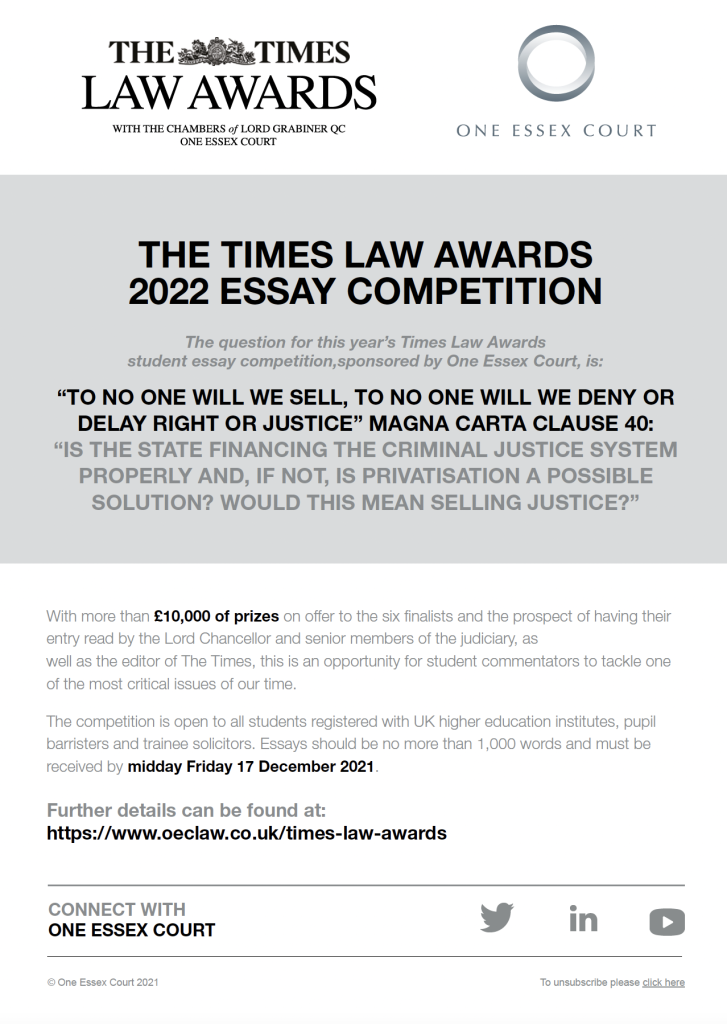Time running out to enter the Times Law Essay Competition!
The deadline for this year’s Times Law Awards Essay Competition is this Friday|: 17th December. Here’s the title:
“To no one will we sell, to no one will we deny or delay right or justice.” Magna Carta clause 40
Is the state financing the criminal justice system properly and, if not, is privatisation a possible solution? Would this mean selling justice?
More than £10,000 of prizes are on offer to the six finalists, plus the prospect of having their entry read by the Lord Chancellor and senior members of the judiciary, as well as the editor of The Times. In addition, the winning essay will be published in The Times.
Essays should be no more than 1,000 words and must be received by midday on Friday 17 December. The competition is open to to all students registered with UK education institutes, and to trainee solicitors and pupil barristers. You have 1000 words max to make an impact!
Find out more about the competition, including the full details of rules and links to the entries from past winners at the competition website.
Here’s a more detailed rundown on the essay title to whet your appetite:
Magna Carta clause 40 stands as an ancient bulwark against State tyranny, but although the administration of criminal justice is one of the fundamental powers of a State, it is also a responsibility. The question for this year’s Times Law Essay Competition asks whether the State is discharging this responsibility and if not, whether it can delegate it to the private sector.
There are more than £10,000 of prizes on offer to the six finalists, whose entries will be read by the Lord Chancellor and senior members of the judiciary, as well as the editor of The Times. This is an opportunity for student commentators to examine the issues facing the criminal justice system today, and the potential solutions.
A fair and efficient criminal justice system is dependent on the quality of its judges, and of the advocates appearing before them. The complexity of the modern world is ever-increasing. Even straightforward cases require parties to collate and review significant volumes of material. The internet is facilitating ever more sophisticated, fast-moving, and international criminal activity. Such factors make the preparation of criminal cases for trial more time-consuming and labour intensive.
The Criminal Bar Association has said that criminal defence barristers’ fees have repeatedly fallen in real terms over the past 24 years; the Law Society has reported that criminal defence solicitors have not received any fee increase over the same period. An Independent Review of Criminal Legal Aid is currently ongoing, chaired by Sir Christopher Bellamy QC. It will consider how access to criminal justice can be reformed, whilst paying criminal barristers and solicitors a fair income. Additional funding for courts and legal aid was announced in the Budget, but will this be enough? Is the current system of financing criminal justice fit for purpose?
Examples in recent years of the involvement of the private sector in the criminal justice system include the operation of some prisons, and parts of the probation service. Such projects may be intended to improve outcomes, but do they really relieve the State of the burden of providing such services? Allocating and supervising performance of such contracts remains a matter for the State. Who steps in if the contractor does not perform – or goes bust? Ultimately do they save the State any money?
Such practical concerns are important, but there is a more fundamental question: is the administration of justice something that can properly be delegated to the best – or lowest? – bidder? What might be the consequences for the authority of the law, if it is administered by a private company?

